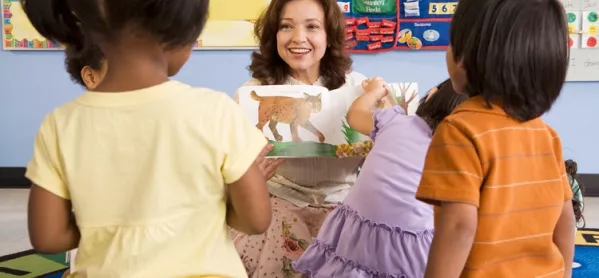- Home
- Early years: Unions urge Justine Greening to rethink nursery school funding
Early years: Unions urge Justine Greening to rethink nursery school funding

The survival of England’s 400 nursery schools is threatened by changes to government funding, unions and early years organisations are warning in an open letter to education secretary Justine Greening.
The joint letter [see below] calls for a rethink of funding plans which, the signatories say, are “incredibly concerning”.
The government has recently consulted on plans to create a new national funding formula for early years, as part of plans to offer working parents 30 hours of free childcare.
The proposals include a universal base rate for providers to bring about greater equality in funding between different types of provider. The consultation document says that it knows that maintained nursery schools have additional costs, compared to private and voluntary sector nurseries, because they are schools with qualified teachers. To reflect this it is proposing supplementary funding for maintained nursery schools for at least two years.
But the letter, signed by the ATL, NAHT, Voice, Unison, GMB unions, the Early Childhood Forum which is an umbrella group for early years organisations, the Early Education campaign group and Labour MP Lucy Powell, says that a promise of two years’ supplementary funding is not enough.
“By just setting out funding plans for two years, nursery schools cannot plan long term and deliver the stability that parents and employees need,” it says.
Russell Hobby, general secretary of the NAHT heads’ union, said: “The government has ignored the fact that early years settings come in all shapes and sizes and some have legitimately higher costs than others. Nursery schools achieve their fantastic results by employing more highly qualified staff. The government must rethink its early years funding plans to ensure nursery schools are not forced to close.”
Ms Powell, chair of the All Party Parliamentary Group on Nursery Schools and Nursery Classes, said maintained nursery schools “should not become the fall guys because ministers cannot make their childcare pledge add up”. “We need adequate funding for all settings but we must protect these centres of excellence and put them on a long term sustainable footing which recognises their importance,” she said.
The letter comes after a report from the NAHT and Early Education campaign group published in September estimated that 80 per cent of maintained nursery schools would see a drop in funding of 25 per cent of more after the two years’ of extra support has ended.
The DfE has been contacted for comment.
The letter on the future of early years
Dear Justine,
Future of nursery schools
We are writing to you regarding the future of nursery schools, and the impact of the government’s proposed changes to the early years funding formula.
The government has set out a number of important changes to early years funding, and we welcome the proposals to increase funding and to extend the provision of free early education and childcare provision to 30 hours a week.
However, plans to cut funding to nursery schools in two years’ time are incredibly concerning for head teachers running those settings, for parents and children who rely on them, and for early years practitioners working in them. By just setting out funding plans for two years, nursery schools cannot plan long term and deliver the stability that parents and employees need.
We know that nursery schools deliver high quality early years education for children. Indeed, 100 per cent of nursery schools are now rated good or outstanding by Ofsted. We know that such schools deliver crucial support to some of the most disadvantaged pupils; 65 per cent of nursery school places are located in the 30 most deprived areas of the country.
Led by a head teacher, such settings have graduate level staff and professional early years practitioners who deliver high quality, focused early years education. They are required to meet the standards and regulations for schools as well as for early years provision. Nursery schools provide valuable training placements and CPD, boosting skills in the early years sector as a whole.
Nursery schools provide an efficient and cost-effective way to improve social mobility and to tackle the educational disadvantages many young children face. In your party conference speech in October you spoke passionately about improving social mobility, as both a moral objective of the government’s, and as an essential part of making Britain economically successful. We agree. But the best way to do this is to invest in early years education, not to take money away from the highest quality part of the system.
We know that maintained nursery schools have higher fixed costs than other settings but their value is such that instead of closing nursery schools, we should be investing in them.
We ask you to think again about the proposals. Nursery schools require adequate, long term funding in order to continue to deliver the high standard of education children need. We know nursery schools work. It is time to invest in them.
Yours sincerely,
Dr Mary Bousted, general secretary, ATL
James Bowen, director, NAHT Edge
Russell Hobby, general secretary, NAHT
Deborah Lawson, general secretary, Voice
Melian Mansfield, chair, Early Childhood Forum
Beatrice Merrick, chief executive, Early Education
Lucy Powell MP, chair of the All Party Parliamentary Group on Nursery Schools and Nursery Classes
Dave Prentis, general secretary, UNISON
Tim Roache, general secretary, GMB
Keep reading for just £1 per month
You've reached your limit of free articles this month. Subscribe for £1 per month for three months and get:
- Unlimited access to all Tes magazine content
- Exclusive subscriber-only stories
- Award-winning email newsletters



